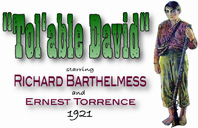

Richard Schickel (D.W. Griffith - An
American Life, Simon and Schuster, 1984)
"Because there was no role in Orphans of the Storm
for Barthelmess, he formed his own company, bought the rights
to Tol'able David from Griffith for $7500, and with Henry
King directing his first important film, from a scenario by Edmund
Goulding, he would enjoy an enormous success with it (when he
screened the picture for his mentor, Griffith embraced and kissed
Barthelmess at the end).
David Robinson (Hollywood in the Twenties,
A.S. Barnes and Company, 1968)
"It is a model of classical film technique, and is quoted
at length by Pudovkin as exemplifying the use of the plastic materials
of the cinema. It is a masterpiece both of post-Griffith ideas
of montage (for which the Soviet directors most valued it) and
for the mise en scéne: the awkward adolescent love affair,
for instance, is captured in a few, brief, vivid, exactly placed
scenes."
William K. Everson (American Silent Film,
De Capo Press, 1998)
"Tol'able David is a simple tale, told with unspectacular
but solid technique and real style. Well scripted (by Edmund Goulding),
leisurely without being slow, unfolding against quietly lovely
rural backgrounds and with fine photography (by Henry Cronjager)
of sweeping panoramic and pastoral scenes, it is not only King's
best picture but also Barthelmess's."
Lewis Jacobs (The Rise of the American
Film, Harcourt, Brace & Company, 1939)
"Tol'able David, shown to an unsuspecting audience
with a minimum of advance publicity, made its mark immediately
as a small-town masterpiece. During a year when the industry was
undergoing its first major depression, when people were staying
away from the 'scandalizing' Hollywood products, when panicky
producers were making more and more lurid 'sexy' pictures to attract
customers, the public flocked to see this simple, unextravagant,
sincere, and moving tale of Southern life.
"Tol'able David was what is known as a smash hit. Its subject matter - the tale of a poor mountain boy - was fresh and unstereotyped; its setting was real; its characterizations were honest and rounded; the narrative was simple and unmelodramatic; the whole picture was frank and pungent rather than sentimental."
James Card (Seductive Cinema, Alfred
A. Knopf, 1994)
"'Subtitles,' as they were called, were always an aesthetic
weakness of the medium. Worst were the titles that gave away what
was about to happen. Second worst were the editorial titles that
told us what to think about what we were seeing. One of the saddest
examples of the latter is Henry King's otherwise fabulous movie
Tol'able David, with its memorable tour de force performance
of Richard Barthelmess. Despite fantastic and magnificently filmed
action in the fight between David and a Goliath of a murderous
monster hillbilly, played by Ernest Torrence in his film debut,
the utterly dispensable titles insist on informing the viewer
over and over how tremendously heroic David is being."
John Baxter (Sixty Years of Hollywood,
A.S. Barnes & Co., Inc., 1973)
"Melodrama is neutralized by unspoiled locations (King was
brought up in the same area) and by Barthelmess's restrained playing
as the cheerful, simple David. Whether losing his pants to a playful
dog in the opening scene and then encountering the curious Esther
with horrified embarrassment, dreaming of being the mail driver,
only to have his dream shattered when the fence on which he is
leaning collapses, or being driven by a steely spirit to recapture
the mail bag from the sadistic Hatburns in a bloodily violent
sequence, he conveys accurately the innocence of strength of rural
life."
Kevin Brownlow (Hollywood: The Pioneers,
Alfred A. Knopf, 1979)
"Tol'able David is one of the enduring classics of
the American screen. . . (it) had all the strengths of a Griffith
film without the drawbacks of exaggerated melodrama."
Joe Franklin (Classics of the Silent
Screen, The Citadel Press, 1959)
"Tol'able David is one of those timeless pictures
that seems every bit as great today as when it was made. A piece
of Americana as authentic as the best of Mark Twain, it will doubtless
till be shown a hundred years from now as an example of part of
the changing American scene.
"The highest praise one can bestow on Tol'able David is that even had Griffith made it as he planned, it probably wouldn't have been a better picture than the one Henry King made in 1921 with Richard Barthelmess and little Gladys Hulette."